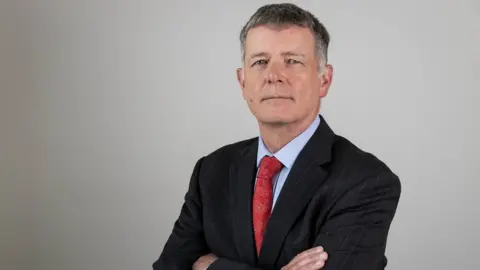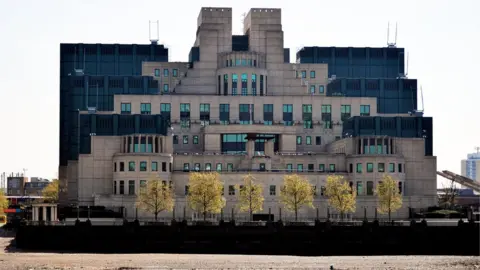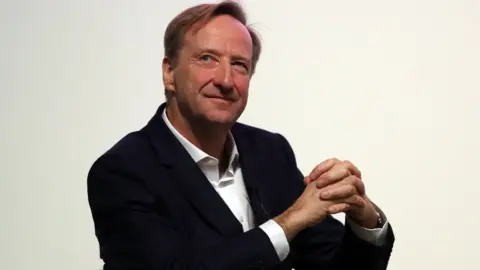MI6: Richard Moore named as new head of Secret Intelligence Service
 Foreign Office
Foreign OfficeThe next chief of the Secret Intelligence Service, otherwise known as MI6, has been named as Richard Moore.
Mr Moore is currently political director at the Foreign Office and a former ambassador to Turkey. He will take over as MI6 chief in the autumn.
He succeeds Sir Alex Younger, who has been in the post for almost six years.
Mr Moore was praised as "an excellent choice" and "calm, engaging, thoughtful and courageous" by a former MI6 chief.
MI6 is the UK's foreign intelligence service and is responsible for gathering intelligence outside the UK.
It says its three core aims are stopping terrorism, disrupting the activity of hostile states, and giving the UK a cyber advantage.
Its counterpart intelligence agency, MI5, is responsible for protecting the UK, its citizens and interests at home and overseas against threats to national security.
Libya-born Mr Moore joined MI6 in 1987 and later held director roles there. He has also been deputy national security adviser in the Cabinet Office.
During his career he has been posted to Vietnam, Turkey, Pakistan and Malaysia.
According to his biography online, he is married with two children and his interests include golf, hiking, scuba diving, Turkish carpets and porcelain, and visiting historical sites. He speaks fluent Turkish and sometimes tweets in it.
'Vital role'
"I am pleased and honoured to be asked to return to lead my service," said Mr Moore.
"SIS plays a vital role - with MI5 and GCHQ - in keeping the British people safe and promoting UK interests overseas.
"I look forward to continuing that work alongside the brave and dedicated team at SIS."


The job of "C" involves balancing what goes on inside the confines of MI6 with the outside world.
Internally, a chief needs to make sure MI6 is able to keep producing intelligence from agents.
This requires complex decisions about risk and resources, but also making sure the secret service keeps up with technology - the interconnected data-driven world is challenging traditional spying because it makes it harder to keep secrets and work undercover.
But a chief also needs to navigate the wider world, sometimes acting as a secret diplomat maintaining alliances which deliver intelligence co-operation and occasionally running back-channel contacts with sensitive countries.
A chief also needs to navigate Whitehall. There was a time when they would have little contact with the prime minister but that has changed as relations have got closer - too close, many felt, in the run up to the Iraq War.
Richard Moore's CV - which includes operational time in MI6 at the start of his career, then as an ambassador and finally in the corridors of power - is likely what helped secure him the job.

John Sawers, who served as MI6 boss for five years until 2014, said Mr Moore "has the perfect blend of experience - running intelligence operations and holding senior positions in diplomacy and policy formation".
"He knows how intelligence is produced and how it is best used to protect our national security."
 PA Media
PA MediaMr Sawers added: "I have known Richard for many years. He is calm, engaging, thoughtful and courageous - all qualities that will be essential for the demanding role of chief of MI6, especially during these challenging times."
Outgoing MI6 chief Sir Alex said: "Richard is a highly accomplished intelligence officer and we look forward to welcoming him back to the service."
 Getty Images
Getty ImagesForeign Secretary Dominic Raab appointed Mr Moore with the agreement of the prime minister.
"He returns to SIS with tremendous experience and will oversee the work of a group of men and women whose tireless efforts are rarely seen in public, but which are critical for the security and prosperity of the UK," he said.
"I pay tribute to Sir Alex Younger for everything he has done during his time leading the Secret Intelligence Service.
"He has carefully and effectively guided the service during a time of increased and more diverse threats."
Sir Alex took up the role of SIS chief - known as "C" - in 2014.
Public speeches by the head of MI6 are rare. In 2018, Sir Alex spoke at the University of St Andrews, where he studied as an undergraduate.
In the speech, he raised questions over Chinese technology companies being involved in the UK's communications infrastructure.
He also said Russia should not underestimate the UK's capabilities.
